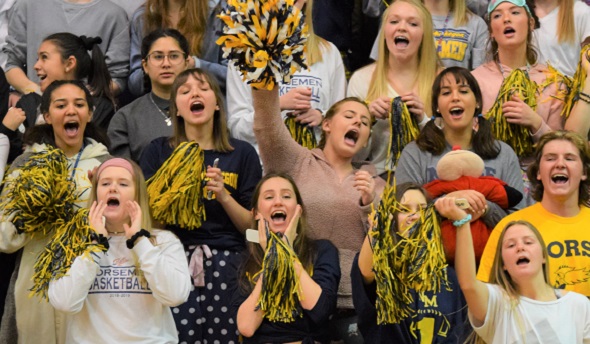
Post-Event Celebrations
March 16, 2012
In my last posting I praised the high school participant as the best behaved athlete on any level of sport. It’s ironic: based on what we see on higher levels, the older the athlete becomes, the more immature he or she is allowed to behave.
But we do have at least one conduct problem; and it’s one with potential for much bigger problems. It’s post-event celebrations.
Post-event celebrations have led to property damage, and they will lead to personal injuries unless we give the problem more careful attention and supervision.
Post-event celebrations are largely outside of the published playing rules, and they are usually beyond the jurisdiction of contest officials.
So, they will end up being the responsibility of game administration, and injuries will become the liability of game administrators.
This spring, the Representative Council may adopt more policies and procedures to which the MHSAA will direct more attention. The initial focus, as proposed, is on MHSAA team tournaments and to hold participating schools more explicitly accountable for property damage caused by celebrating teams and spectators.
Hopefully, attention to the broader topic and tougher policies for this narrow slice of the problem will reverse what we see as an unhealthy trend in school sports – excessive post-event celebrations.

BOTF IX: Can You Cheer with the Champs?
By
Geoff Kimmerly
MHSAA.com senior editor
December 10, 2019
Six schools have won at least one Battle of the Fans championship since the contest was created during the 2011-12 school year.
This year, it could be your school's turn to show it has the top high school cheering section in Michigan.
The MHSAA's Student Advisory Council is calling all contenders to take part in Battle of the Fans IX.
North Muskegon was named last year’s champion and presented with a banner during the MHSAA Boys Basketball Finals at Michigan State University’s Breslin Center. Sections from Buchanan and Saginaw Heritage also were finalists, with Ann Arbor Father Gabriel Richard, Carson City-Crystal, Petersburg-Summerfield, Petoskey, Traverse City West and Wayland’s sections also making the semifinals.
Schools are invited to submit a short video, via YouTube, of their cheering sections in action at a school sporting event. Video submissions should be between 90 seconds and three minutes long and explain how that section meets the following contest criteria: positive sportsmanship, student body participation, school spirit, originality of cheers, organization of the group, student section leadership and fun.
The deadline for student-submitted video applications is noon Jan. 11. Nine semifinalists then will be chosen – three each from Class A, Class B and Class C/D – to partake in a two-week challenge where each will be required to complete 10 tasks further showing why it should be chosen as Michigan’s best student section. From those nine, three finalists then will be selected by the Student Advisory Council and visited on a home game night by MHSAA staff and Advisory Council representatives. The MHSAA will produce a video of that finalist after each visit, with the champion being selected by the Student Advisory Council based in part on support each section receives on the MHSAA’s social media sites.
This year’s Battle of the Fans IX winner will be announced Feb. 21 and recognized March 27 at the Breslin Center.
“Nearly a decade after our Student Advisory Council developed this first-of-its-kind contest, Battle of the Fans is still going strong —not only as a way to award supreme sportsmanship, but also as an engine to drive school spirit,” said Andy Frushour, MHSAA director of brand management and advisor to the Student Advisory Council. “Over the first eight years, we have had plenty of winners that started as small, unorganized and negative student sections. But with enough planning and assistance from administration – and over just three short months – those sections turned into loud, crazy, fun places to be on game nights. We hope that happens with schools again this winter.”
Rules, directions for submitting videos, plus links to coverage of finalists from the first eight years of the contest can be found on the MHSAA Website. This year’s finalist videos, plus the announcement of the 2019-20 winner, will be published on Second Half.
The Student Advisory Council is made up of eight seniors and eight juniors who each serve two-year terms. The Council acts as the voice of Michigan's student-athletes; it serves as a student sounding board for the MHSAA's Representative Council, assists in planning Sportsmanship Summits, Captains Clinics and other student leadership events; participates in a yearly focus group about the state of high school sports for Michigan State University's Institute for the Study of Youth Sports and assists with medal ceremonies at MHSAA championship events.
PHOTO: Traverse City West shined plenty of bright lights when we visited as part of the 2017 BOTF finalists tour. VIDEOS: Below, check out the videos from our visits to all of the first eight BOTF champions.

